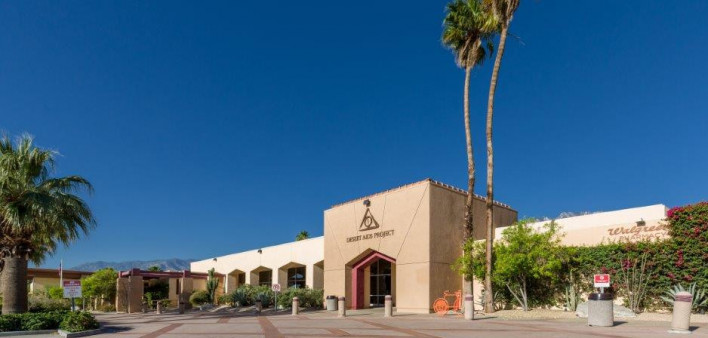Update: After this article was published, the CEO of Desert AIDS Project, David Brinkman, disclosed that he tested positive for COVID-19. You can read about his struggles and concerns in the Q&A “Coming Out All Over Again.”
Timing is everything. On March 2, the Desert AIDS Project (DAP) celebrated the opening of two new clinics in one central location in Palm Springs, California. The fanfare was short-lived, and part of the facilities was put to vital and unexpected use: battling a totally different pandemic.
On March 16, DAP added a COVID-19 Triage Clinic to its health center, where health care providers evaluate clients for multiple upper and lower respiratory diseases, such as COVID-19, which is caused by the novel coronavirus. To be clear, the triage clinic is not replacing an HIV clinic; it’s an additional service for the community.
“The entire team at DAP has stepped up to respond to the COVID-19 pandemic,” explains the organization’s CEO, David Brinkman, in a video statement you can watch above. “We know that this is our one chance to get ahead of the curve. Our organization was founded at the beginning of the HIV/AIDS pandemic. This work is in our DNA. We know this isn’t simply screening people. But when people become quarantined, it’s providing food and medication to them so they can stay in their home and receive the support they need from this organization. Caring for and treating people with COVID-19 is a part of what makes up DAP.”
“We saw almost 100 clients the first week,” DAP spokesman Jack Bunting tells POZ, adding that “while screening and some testing for COVID-19 are starting to become more available throughout the Coachella Valley, the COVID-19 Clinic at DAP is the only clinic offering treatment for other respiratory illness that can present in a similar manner. The uninsured are never turned away.”
The COVID-19 clinic doesn’t have rooms for patients to stay in overnight, but some clients were sent to intensive care units because they were so sick. Bunting says others are healing at home; as they do so, DAP staff provide supplies and run errands for them.

A view of the new buildings Desert AIDS Project opened March 2 in Palm Springs, California.Courtesy of DAP
DAP does not offer on-demand COVID-19 testing for asymptomatic clients; people who think they have COVID-19 must first call the hotline at 760-992-0407 and discuss their symptoms with a DAP clinician. Further information about the new coronavirus is available here on DesertAIDSProject.org.
The Coachella Valley community is at heightened risk for COVID-19, and Bunting is quick to enumerate the reasons why:
- Palm Springs, in the Coachella Valley, has the highest prevalence of HIV-positive gay men over age 50.
- More than 51% of Coachella Valley residents live in poverty and lack adequate access to health care.
- Because the region’s economy is tourism-driven, many residents are out of work and will become impoverished. The working poor (now not working) are more likely to fall out of medical care, lose their housing and, in panic, not follow heightened hygiene and social distancing protocols.
- Air quality in the area is poor, and many people, especially children, have respiratory diseases like asthma.
- Hispanic residents, who account for more than 50% of the population in the Coachella Valley, are three times more likely to face poverty than white residents.
- The region has a significant number of transgender, gender-nonconforming and nonbinary residents with a history of being locked out of health care.
Since 1984, DAP has served the needs of people living with HIV in the Coachella Valley. Today, in addition to offering social services such as case management and food and housing assistance, DAP is a federally qualified health center (FQHC) able to offer primary and specialized medical care, including dentistry, testing, prevention and mental health.

Another view of the new buildings Desert AIDS Project opened March 2 in Palm Springs, California.Courtesy of DAP
“No services have been cut whatsoever” because of the COVID-19 clinic, stresses Bunting, though the statewide stay-at-home order to stem the spread of the coronavirus has meant that DAP now reaches its clients through telemedicine services—meaning clients access their health care and participate in virtual meetings through internet-enabled devices. What’s more, DAP had to suspend nonurgent dental appointments and services, such as house cleaning.
“You could say that DAP was meant for this [COVID-19] pandemic and meant for these times, based on what it learned from the early days of the AIDS epidemic and its identity as a humanitarian organization,” Bunting says. “We’ve taken what we learned in those horrible times and applied it to other health threats to our community, such as hepatitis C. To us, this is paying it forward.”
In related news, POZ recently profiled the HIV community of Palm Springs. For more, read “Older and Wiser: How HIV long-term survivors contribute to a better future for everyone.”
Working at a clinic providing HIV services? POZ wants to know how the COVID-19 pandemic has affected your HIV/AIDS organization. Please click here to share your story.
Go to poz.com/tag/coronavirus for our continuing coverage of COVID-19.







Comments
Comments